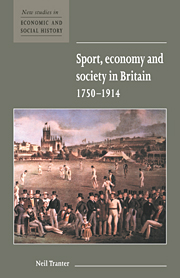6 - No place for women?
Published online by Cambridge University Press: 18 December 2009
Summary
All historians are agreed that the Victorian and Edwardian ‘revolution’ in sport was predominantly a male phenomenon in which females, and working-class females especially, had relatively little part. Fragmentary though it is, there is sufficient evidence to suggest that in earlier ages working-class women were more frequent participants in sport. At various times between the seventeenth and early nineteenth centuries they were regularly recorded among the crowds at horseraces, cricket matches, rowing and pedestrian events and at animal blood sports like bull-baiting and combat sports like prize-fighting, wrestling, sword-fighting and cudgelling. In the sports of football, rowing, cricket and, occasionally, prize-fighting some even participated actively (Guttmann, 1985: 105–7, 116–17; 1991, 71–9; Wigglesworth, 1986: 148; Huggins, 1987: 101; Brailsford, 1991: 74, 78–9, 131, 133). Because of the scattered and imprecise nature of the evidence, the extent of this participation cannot be quantified exactly. But the general assumption is that it was more extensive than it was to be in Victorian and Edwardian times. Apart from women's continued involvement in street games during childhood, a moderate and variable level of attendance at regattas and Highland Games gatherings and a possible increase in their numbers at horse race meetings, by the beginning of the Victorian period working-class females had largely disappeared from the crowds at sporting events, particularly from those of a more violent kind like prize-fighting. By the third quarter of the nineteenth century there were no female pugilists and the number of working- class women actively participating in sports such as cricket, football, footracing and other forms of pedestrianism was negligible (Guttmann, 1985: 111; Brailsford, 1991, 133–6; Murray, 1994:49).
- Type
- Chapter
- Information
- Sport, Economy and Society in Britain 1750–1914 , pp. 78 - 93Publisher: Cambridge University PressPrint publication year: 1998



